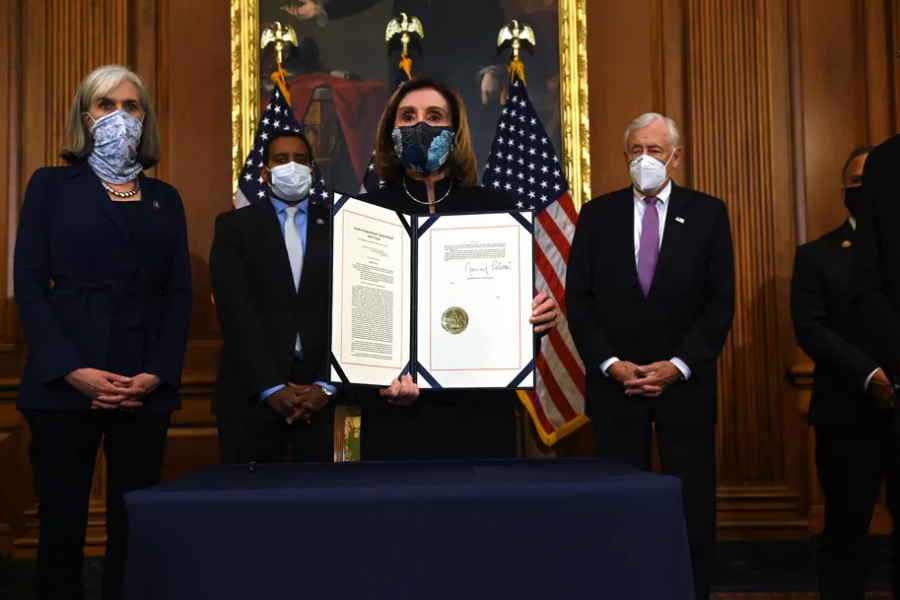Senate impeachment trial for Trump begins early next week
Students and faculty share their thoughts on the matter
More stories from Spencer Kristof
Photo by SUBMITTED
Speaker of the House Nancy Pelosi (D-CA) holds signed article of impeachment during a ceremony after the vote to impeach President Donald Trump at the US Capitol, January 13, 2021.
For the first time in United States history, a president has been impeached for a second time.
On Jan. 13, the House of Representatives adopted an article of impeachment against Donald Trump for “incitement of insurrection,” claiming he incited the storming of the U.S. Capitol on Jan. 6.
One week after the impeachment, Trump’s term expired and Joe Biden was inaugurated on Jan. 20.
Although Trump has left office, the trial for his impeachment is scheduled to begin on Feb. 9, 2021. In order to convict the former president, 17 republican senators would have to vote along with all of the Democratic senators.
Eric Kasper, a political science professor, said there are disagreements between the House managers and Trump’s legal team over whether a former president can face a trial in the Senate.
“Article II, Section 4 of the Constitution states that ‘the President, Vice President and all civil officers of the United States, shall be removed from office on impeachment for, and conviction of, treason, bribery, or other high crimes and misdemeanors,’” Kasper said.
According to this argument, because impeachment is designed to remove someone in office, a trial is unable to occur because Trump has already left office and therefore cannot be impeached, Kasper said.
There is precedent, however, for an impeachment trial for a federal officer after he has left office, Kasper said. William Belknap, a former secretary of war, went through an impeachment trial after he had resigned in 1876.
“A second major argument that is likely to be contested by the House managers and President Trump’s legal team will be whether the speech that President Trump gave on January 6 should be the basis for an impeachment,” Kasper said.
According to Supreme Court precedent, “the constitutional guarantees of free speech and free press do not permit a State to forbid or proscribe advocacy of the use of force or of law violation except where such advocacy is directed to inciting or producing imminent lawless action and is likely to incite or produce such action.”
Kasper said if one is advocating for illegal action, that speech is protected by the First Amendment unless the speech is specifically intended to incite lawless action which is imminent. He said this is a very high standard for conviction and this makes speech rarely criminal in this context.
“According to this standard, there is a strong case that President Trump’s expression was speech protected from criminal prosecution,” Kasper said.
Article II, Section 4 uses the language “high crimes and misdemeanors” when citing what a federal officer can be impeached for.
Kasper said the phrase comes from English law, where it was used during parliamentary impeachments. These impeachments included cases when the activity in question was not criminal.
“Alexander Hamilton in ‘Federalist No. 65’ explained that impeachment was meant to apply to cases of ‘misconduct’ and those involving ‘the abuse or violation of some public trust,’” Kasper said. “Using this understanding of ‘high crimes and misdemeanors’ would mean that even some constitutionally protected expression could be impeachable if used by a president.”
Kasper said although this is a trial, the Constitution states the Senate has full authority to impeach federal officers, meaning the courts will likely not hear cases appealing what the Senate does in the upcoming impeachment trial.
Although the campus favored Joe Biden in the Nov. 3 election by almost two to one, according to public voting records, some students disagreed with the idea of holding a trial for a president who has left office since his impeachment.
Timothy Krueger, former president of the UW-Eau Claire College Republicans and fourth-year finance student, said Democrats aren’t concerned with the law and disregarded what happened on Jan. 6.
“In Trump’s speech he mentioned many times to be peaceful. Then when it started he told them to go home,” Krueger said. “Not really sure who in their right mind could support impeachment off of these facts.”
Ethan Coyle, a sixth-year geography student, also disagreed with the idea of impeachment.
“They’ve already impeached him once and with political tensions being as high as they are right now, I don’t think it’s a good idea to drive more of the division,” Coyle said.
UW- Eau Claire College Democrats were not available for comment.
The trial will begin Tuesday at 2 p.m. CT and run for more than a week. It can be watched live on various news channels such as PBS, Fox News, MSNBC, CNN and C-SPAN.
Kristof can be reached at [email protected].











